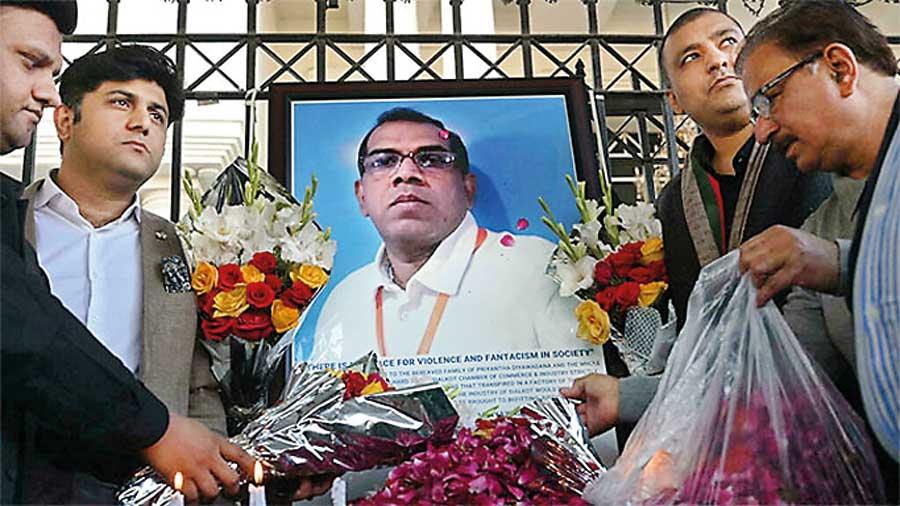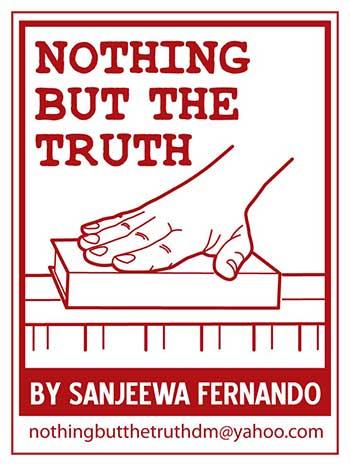08 Dec 2021 - {{hitsCtrl.values.hits}}
“What is religious intolerance when God himself wanted unity, peace, kindness and fellowship among all.”
- Esha Verma

The social media platforms exploded with denunciations, protests, hate speech and what not, with the brutal torture and killing of Sri Lankan Priyantha Diyawadana, 48, a factory Manager in Sialkot, Pakistan. Many commentors on Sri Lankan social media were quick to draw a link with fundamental Islamic Radicalism and this gruesome act, while a few sought to douse the flames of religious hatred that such comments could engender. While the Pakistani PM has vouched to deal strictly under the law against all those who are involved in this heinous act of blood lust, with over 100 persons already arrested, moderate Muslims in Pakistan as well as from all over the world commented publicly, denying the act and apologizing to Sri Lankans for this dastardly act done by an unrestrained few.
Religious extremism and intolerance are not new. It has existed for Millennia and it will be so for a long time to come, unless the moderates among the majority do something, resolutely and quickly, about it. From the Crusades to inquisition in Mediaeval Europe, from Fatwa and honour killings in Pakistan or the Middle East, to acts of violence in Digana or Aluthgama in Sri Lanka, a never-ending spiral of religious hatred and violence seem to grip our societies quite regularly. Even though blood thirsty acts of the nature of the Sialkot incident are few and far in between in Sri Lanka, a simmering tension between followers of the many the religions do exist underneath with the very real potential of flaring up in to bloody pogroms, as we have seen during the past few decades.
come, unless the moderates among the majority do something, resolutely and quickly, about it. From the Crusades to inquisition in Mediaeval Europe, from Fatwa and honour killings in Pakistan or the Middle East, to acts of violence in Digana or Aluthgama in Sri Lanka, a never-ending spiral of religious hatred and violence seem to grip our societies quite regularly. Even though blood thirsty acts of the nature of the Sialkot incident are few and far in between in Sri Lanka, a simmering tension between followers of the many the religions do exist underneath with the very real potential of flaring up in to bloody pogroms, as we have seen during the past few decades.
Not in isolation
But what is more worrisome than the act itself and the involvement of the lynching mob, in relation not only to the Sialkot incident, but to all acts of such intolerance is the fact that they do not occur in isolation. It is not simply a matter of some unruly factory workers in that city took the law in to their own hands, obviously offended by what they call a blasphemous act committed by Priyantha, torturing, killing and then burning his body in public. It happens in a country which is notorious for religious extremism not only in terms of mob activity, but in terms of a state apparatus as well as a constitutional structure that promotes religious exclusiveness and oppression. The Constitution of Pakistan provides for death penalty for acts of blasphemy, whatever in might mean, for those who engage in acts of “imputation, insinuation or innuendo” against Prophet Mohammad.
" It is not simply a matter of some unruly factory workers in that city took the law in to their own hands, obviously offended by what they call a blasphemous act committed by Priyantha, torturing, killing and then burning his body in public"
Despite Premier Imran Khan coming out in strong and public denouncing of the murder and his avowal for stern legal action, it should not be forgotten that Imran Khan has benefitted from extreme and fundamental Islamic sentiment in Pakistan in getting elected. In fact, Pakistan is under sanctions from the European Union on religious oppression and lack of religious freedom. Pakistan remains one of the most fragile of secular states that could at any moment fall in to extremist and fundamentalist Islamic forces, thus making it one of the weakest in the global defence chain in terms of state security.
Reaping the Whirlwind
Such state patronage or at least, tacit condoning of religious fanaticism, does encourage vigilantes to take the law in to their own hands, decide what is right and wrong, punish ‘wrongdoers’ and most disturbing of all, to expect that they could go scot free. Although Imran Khan must be genuinely shocked by the sheer brutality of the incident and obviously honest in his effort to punish the culprits, it nevertheless is a case of ‘sowing the wind and reaping the whirlwind’. But to his credit, he has shown his willingness to take on the extremist elements of the populace despite the electoral implications that might prove to be detrimental to his re-election prospects.
Political currency
Pakistan is not alone in this predicament as India as well as Sri Lanka fall in to the same category of state and political patronage of religious and racial extremism and bigotry, which is very lucrative political and electoral currency. PM Narendra Modhi of India, despite his apparent ‘metamorphosis’ in to a liberal industrialist role, was backed by the BJP which was considered a right-wing racist party and remains a structure that seeks to perpetuate Hindutva supremacy over other religions in India. The same is the case with the Rajapaksas of Sri Lanka, whose patronage of Sinhala Buddhist extremism, especially against the Muslim community and which sentiment is quite craftily and shamelessly tapped upon by them for electoral success and the perceived perpetuation of the Rajapaksa rule. All promises for the rule of law, modernism, secularism, meritocracy and such other lofty sounding tags are nothing but lip service.
"Sri Lanka, do not witness public lynching of political or religious dissenters as yet. The last time that type of thing happened was in July 1983. Yet, state-sponsored killings continued, reaching a height in 1988-89 and even now"
The case of Malik Adnan, the one person who made a valiant effort to save Priyantha, the factory manager from the enraged mob, is to be awarded with the medal of bravery for his life endangering act of trying to shield unfortunate Priyantha, while hundreds-strong vigilante mobs sought to assault and murder his colleague, is indeed a breath of fresh air in this nauseating context of fanaticism and bigotry. Tamgha-i-Shujaat, or the ‘Medal of Bravery’ is one of the top civilian awards in Pakistan given for bravery. Although Adnan finally had to give in to the over powering anger of the mob, the risk that he took in physically shielding Priyantha is an act of valour, according to any standard.
The Moderates
People like Malik Adnan are out there. They are the moderates. They are the ones who act with restraint; who reason with logic and not act with basic animal instinct. They are the ones who perceive religion more in terms of a ‘spiritual being’ rather than a state political structure that dominates other religions and excludes their rights. They are mostly in the minority of the majority, and therefore, not good cannon fodder for the politicians, who are hell bent on coming to and retaining power.
Sri Lanka, do not witness public lynching of political or religious dissenters as yet. The last time that type of thing happened was in July 1983. Yet, state-sponsored killings continued, reaching a height in 1988-89 and even now, in the form of persons dying in police and military custody. The majority does not have a problem with those murders as the victims are portratyed as criminals, terrorists, gangsters etc. The majority of the populace not only tolerate such acts of summary punishments but quite a percentage of them believe that is how they should be dealt with. The culture of impunity thus nurtured by the politicians are fertilized by the approving majority. The Moderates are the traitors, the villains and the ‘apathayas’.
The entire human civilisation is now confronted with many catastrophes; some like COVID-19, are arguably, natural while terrorism, extremism and corporate greed are human made. It is not an isolated incident that happened in Sialkot; it is everywhere. It is among us. Just that the form of its expression is not that graphic or violent as yet.
28 Nov 2024 28 minute ago
28 Nov 2024 31 minute ago
28 Nov 2024 46 minute ago
28 Nov 2024 2 hours ago
28 Nov 2024 2 hours ago